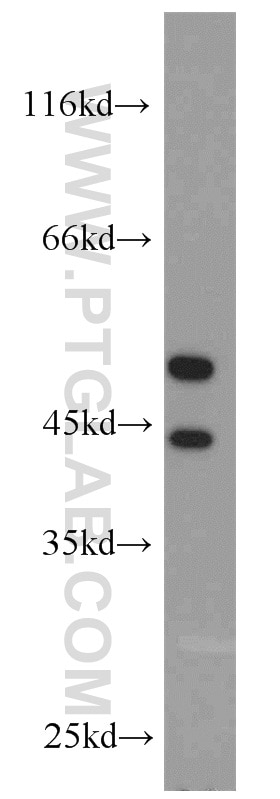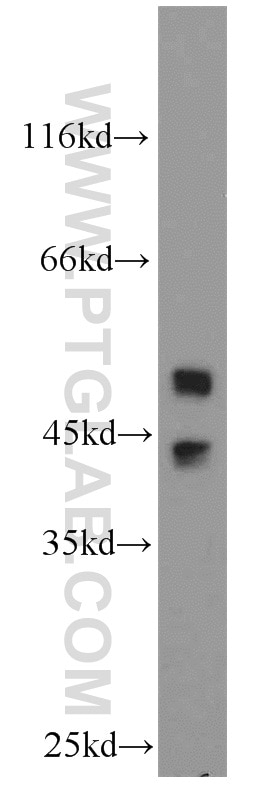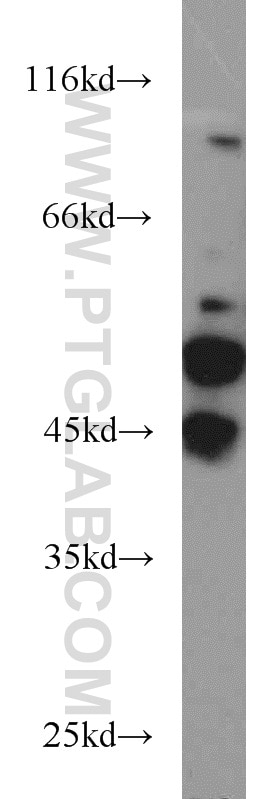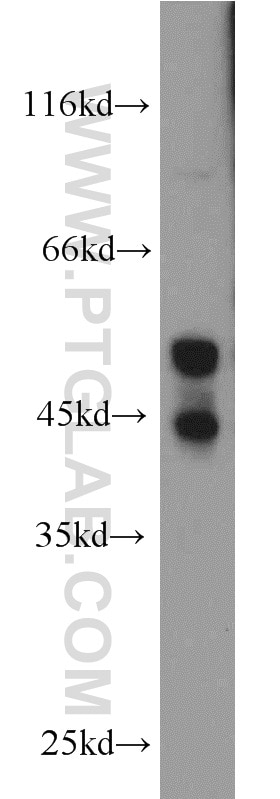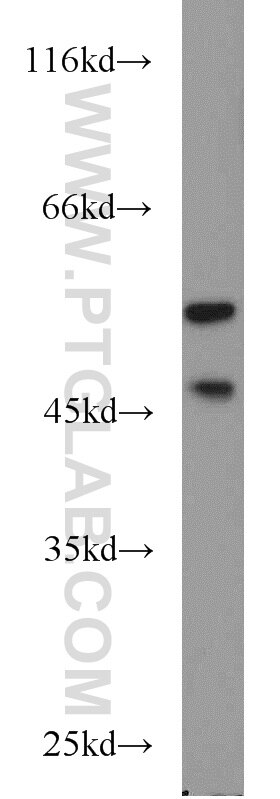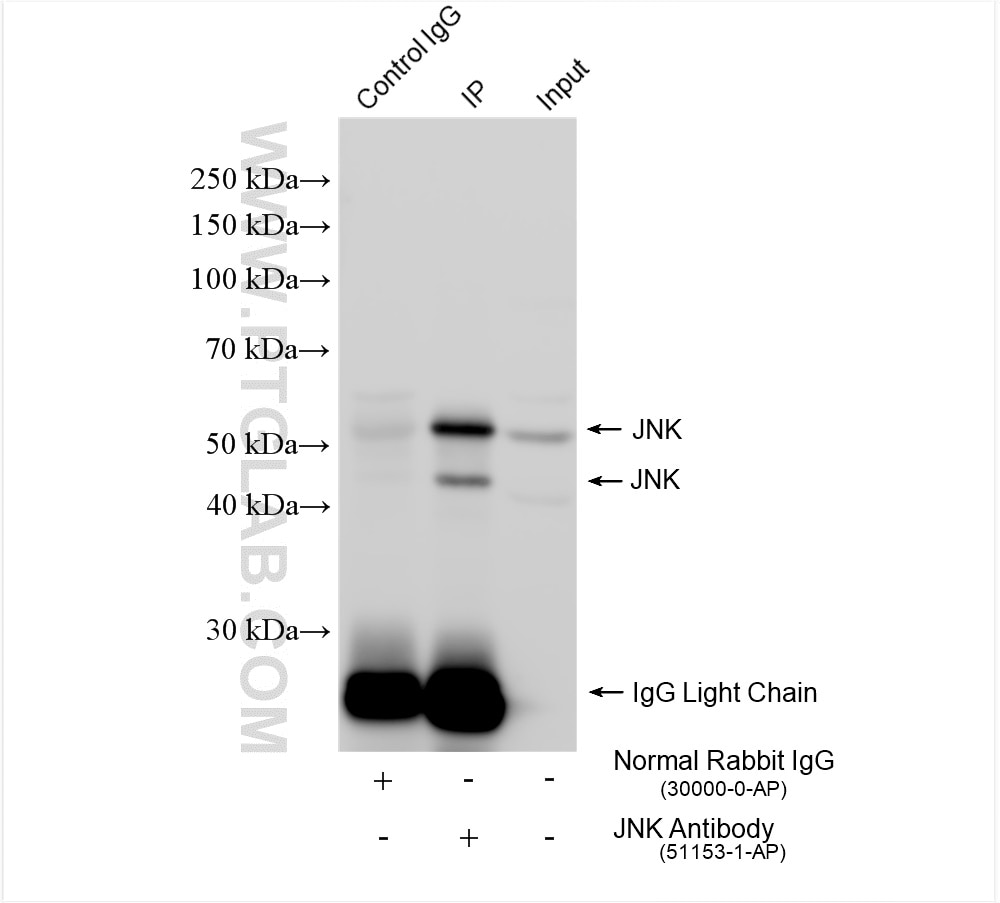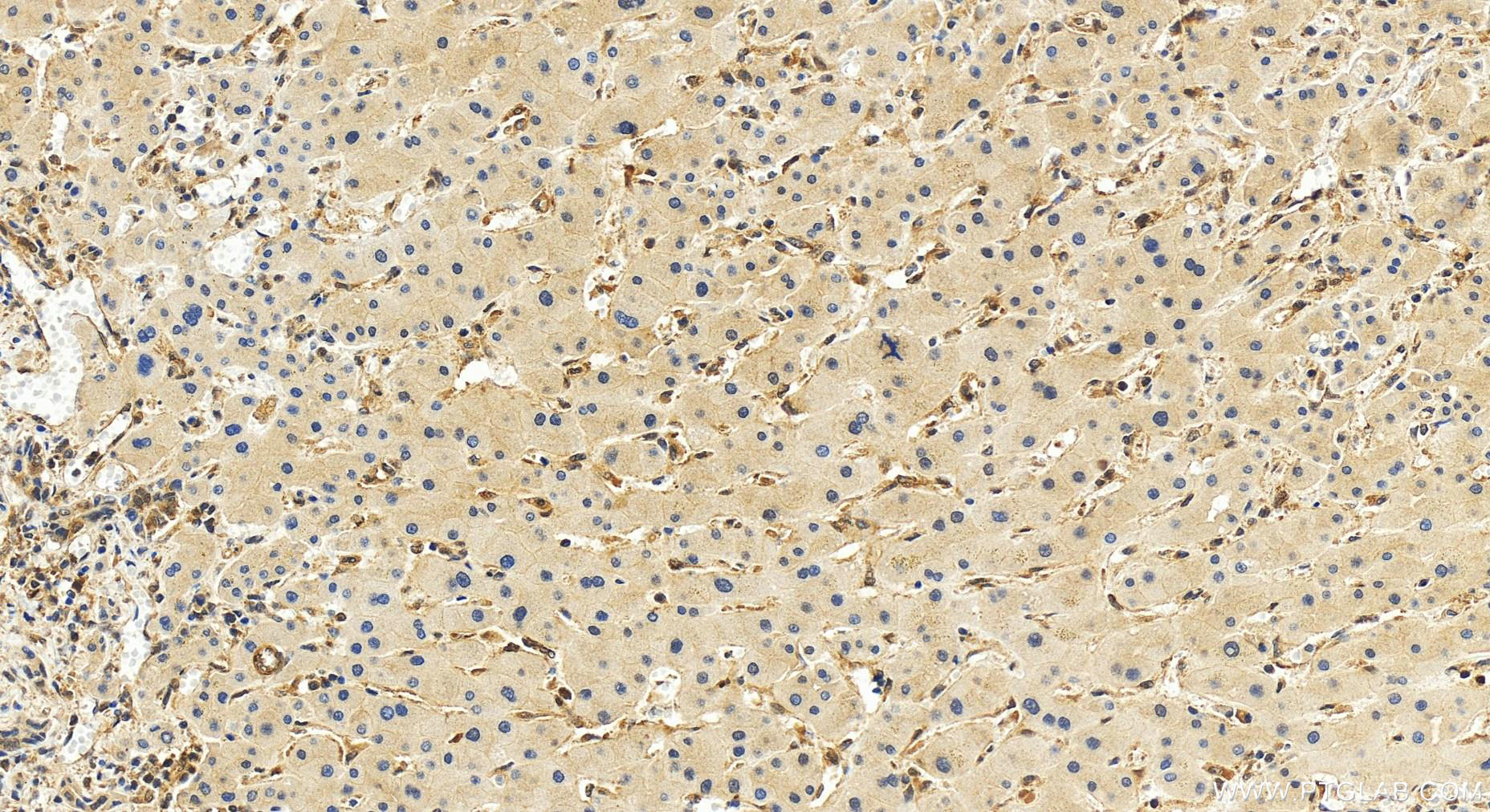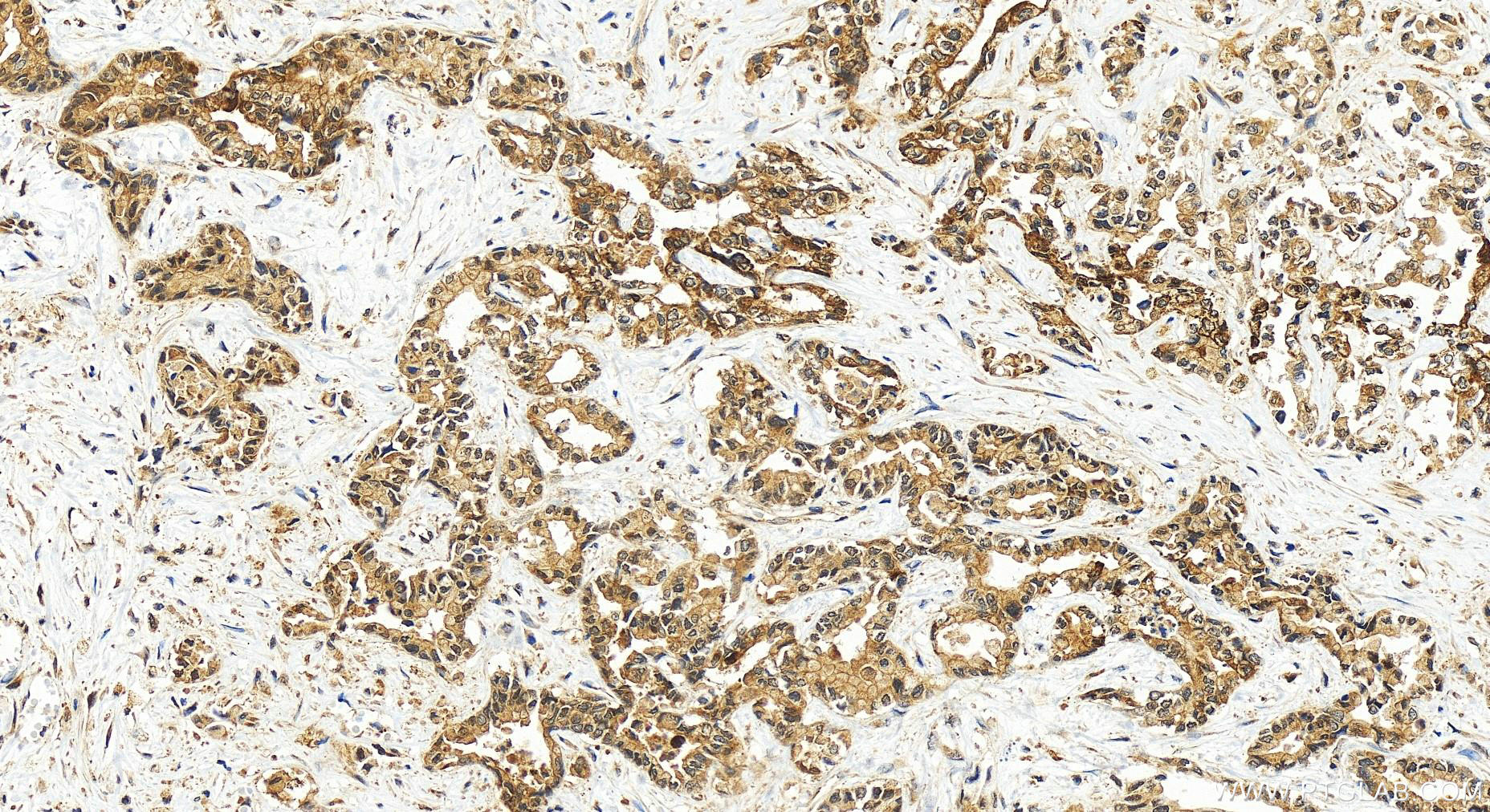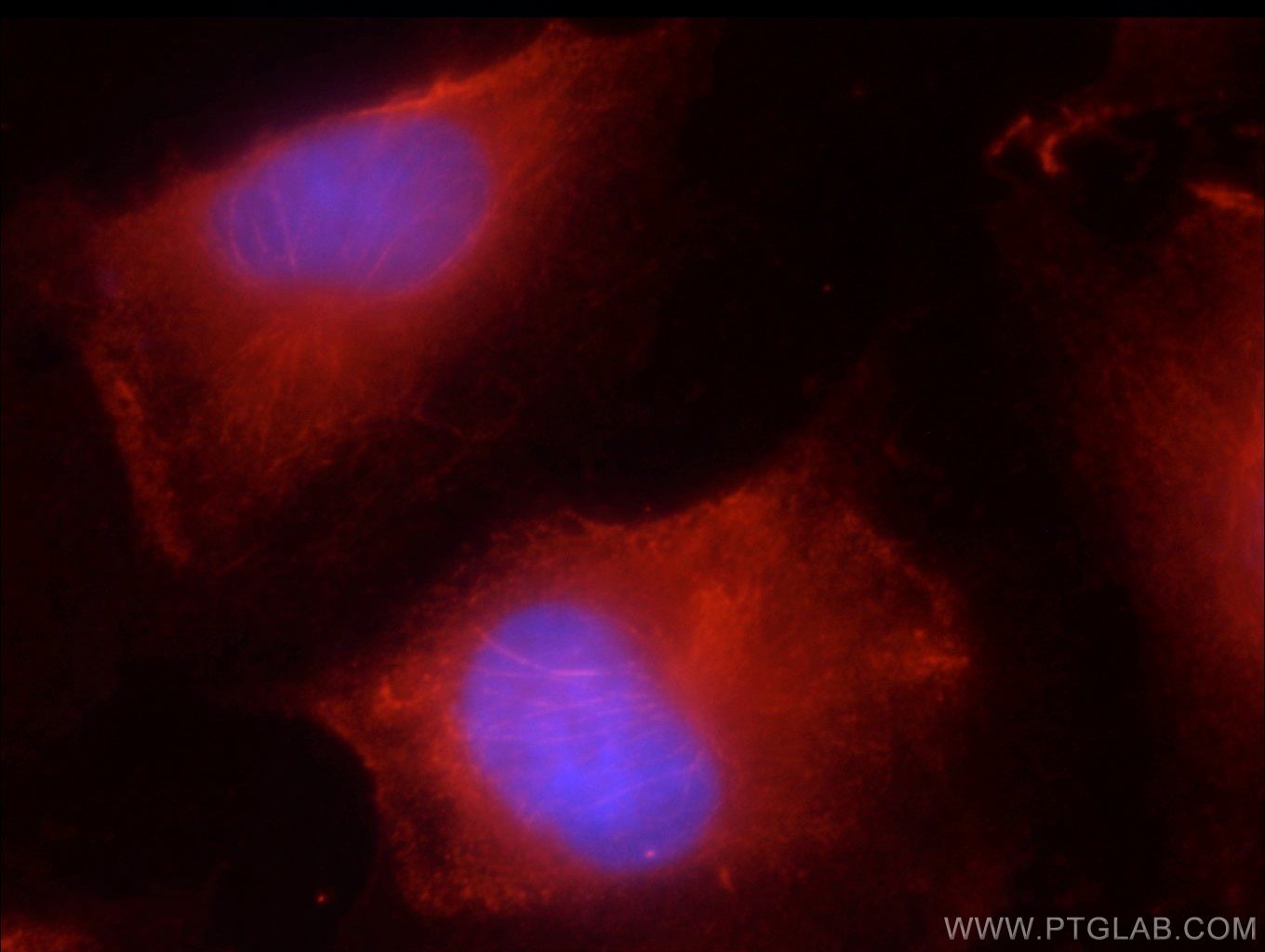Anticorps Polyclonal de lapin anti-JNK
JNK Polyclonal Antibody for WB, IHC, IP, ELISA
Hôte / Isotype
Lapin / IgG
Réactivité testée
Humain, rat, singe, souris et plus (2)
Applications
WB, IHC, IP, ELISA
Conjugaison
Non conjugué
N° de cat : 51153-1-AP
Synonymes
Galerie de données de validation
Applications testées
| Résultats positifs en WB | cellules HeLa, cellules A549, cellules COS-7, cellules NIH/3T3 |
| Résultats positifs en IP | cellules HeLa, |
| Résultats positifs en IHC | human intrahepatic cholangiocarcinoma tissue, il est suggéré de démasquer l'antigène avec un tampon de TE buffer pH 9.0; (*) À défaut, 'le démasquage de l'antigène peut être 'effectué avec un tampon citrate pH 6,0. |
Dilution recommandée
| Application | Dilution |
|---|---|
| Western Blot (WB) | WB : 1:500-1:2000 |
| Immunoprécipitation (IP) | IP : 0.5-4.0 ug for 1.0-3.0 mg of total protein lysate |
| Immunohistochimie (IHC) | IHC : 1:250-1:1000 |
| It is recommended that this reagent should be titrated in each testing system to obtain optimal results. | |
| Sample-dependent, check data in validation data gallery | |
Applications publiées
| WB | See 20 publications below |
| IHC | See 3 publications below |
Informations sur le produit
51153-1-AP cible JNK dans les applications de WB, IHC, IP, ELISA et montre une réactivité avec des échantillons Humain, rat, singe, souris
| Réactivité | Humain, rat, singe, souris |
| Réactivité citée | rat, bovin, Humain, Lapin, souris |
| Hôte / Isotype | Lapin / IgG |
| Clonalité | Polyclonal |
| Type | Anticorps |
| Immunogène | JNK Protéine recombinante Ag1442 |
| Nom complet | mitogen-activated protein kinase 9 |
| Masse moléculaire calculée | 424 aa, 48 kDa |
| Poids moléculaire observé | 44-55 kDa |
| Numéro d’acquisition GenBank | BC032539 |
| Symbole du gène | JNK |
| Identification du gène (NCBI) | 5601 |
| Conjugaison | Non conjugué |
| Forme | Liquide |
| Méthode de purification | Purification par affinité contre l'antigène |
| Tampon de stockage | PBS with 0.02% sodium azide and 50% glycerol |
| Conditions de stockage | Stocker à -20°C. Stable pendant un an après l'expédition. L'aliquotage n'est pas nécessaire pour le stockage à -20oC Les 20ul contiennent 0,1% de BSA. |
Informations générales
c-Jun N-terminal kinases (JNKs), first characterized as stress-activated members of the mitogen-activated protein kinase (MAPK) family, have shown their critical roles in the development of a number of cellular progress and diseases, including proliferation, embryonic development, apoptosis, diabetes, neurodegeneration and liver disease (PMID: 19900593). JNK1, JNK2, JNK3 also name as MAPK8, MAPK9, MAPK10, JNK1 and JNK2 are ubiquitously expressed, but JNK3 is expressed primarily in the brain (PMID: 27698029). This antibody can recognize JNK1, JNK2 and JNK3, we get bands around 44-55 kDa.
Protocole
| Product Specific Protocols | |
|---|---|
| WB protocol for JNK antibody 51153-1-AP | Download protocol |
| IHC protocol for JNK antibody 51153-1-AP | Download protocol |
| IF protocol for JNK antibody 51153-1-AP | Download protocol |
| IP protocol for JNK antibody 51153-1-AP | Download protocol |
| Standard Protocols | |
|---|---|
| Click here to view our Standard Protocols |
Publications
| Species | Application | Title |
|---|---|---|
Adv Mater m6 A Reader YTHDF1-Targeting Engineered Small Extracellular Vesicles for Gastric Cancer Therapy via Epigenetic and Immune Regulation | ||
Cell Rep Med Development of an orally bioavailable CDK12/13 degrader and induction of synthetic lethality with AKT pathway inhibition | ||
Nat Commun SH3RF3 promotes breast cancer stem-like properties via JNK activation and PTX3 upregulation. | ||
Int J Biol Macromol Flammulina velutipes polysaccharide exerts immunomodulatory function involving RSAD2 to regulate the NF-κB/MAPK signaling pathway in RAW264.7 macrophage cells and in mouse spleen cells | ||
Biomed Pharmacother Icariside II suppresses cervical cancer cell migration through JNK modulated matrix metalloproteinase-2/9 inhibition in vitro and in vivo. | ||
Fitoterapia The key active ingredients identification and pharmacological mechanism investigation of extract of ethyl acetate from Er Miao San aganist rheumatoid arthritis |
